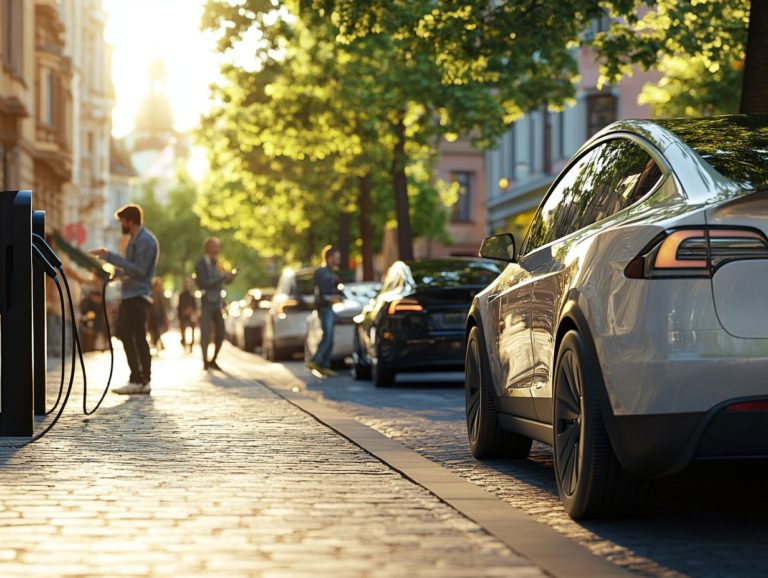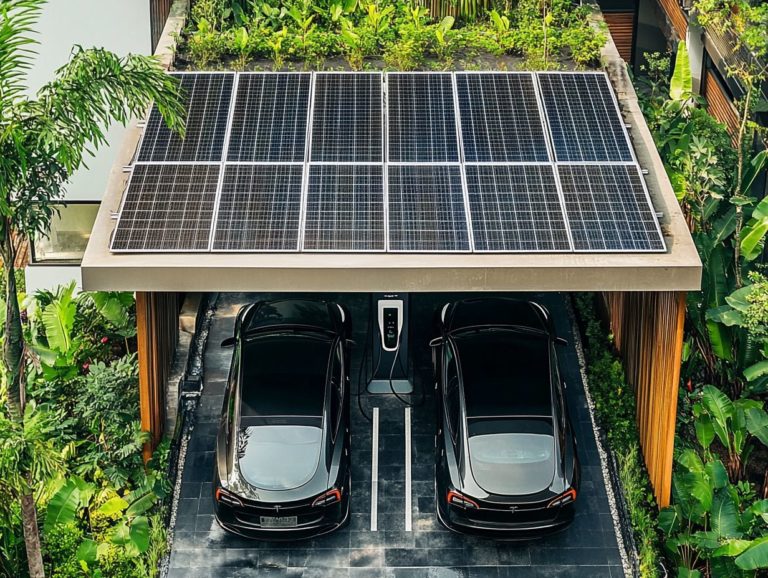the role of renewable energy in ev charging
As electric vehicles (EVs) gain momentum, your commitment to sustainable energy sources becomes increasingly crucial. Embracing renewable energy for EV charging cuts down carbon emissions and elevates the efficiency and sustainability of your transportation systems.
This article invites you to explore the importance of renewable energy in powering EVs. You ll discover various types available such as solar, wind, and hydroelectric and uncover the environmental benefits and potential cost savings they offer.
We ll also address the challenges of integrating renewable energy into existing infrastructure and contemplate the promising future of this vital synergy. Dive in and uncover the transformative role renewable energy plays in making electric transportation greener and more efficient.
Contents
- Key Takeaways:
- The Importance of Renewable Energy in EV Charging
- Types of Renewable Energy Used in EV Charging
- Challenges and Solutions for Implementing Renewable Energy in EV Charging
- Future Outlook for Renewable Energy in EV Charging
- Frequently Asked Questions
- What is the role of renewable energy in EV charging?
- How does renewable energy impact EV charging infrastructure?
- Can renewable energy be used for fast-charging EVs?
- What are the benefits of using renewable energy for EV charging?
- Are there any challenges associated with using renewable energy for EV charging?
- How can I ensure that my EV is charged using renewable energy?
Key Takeaways:
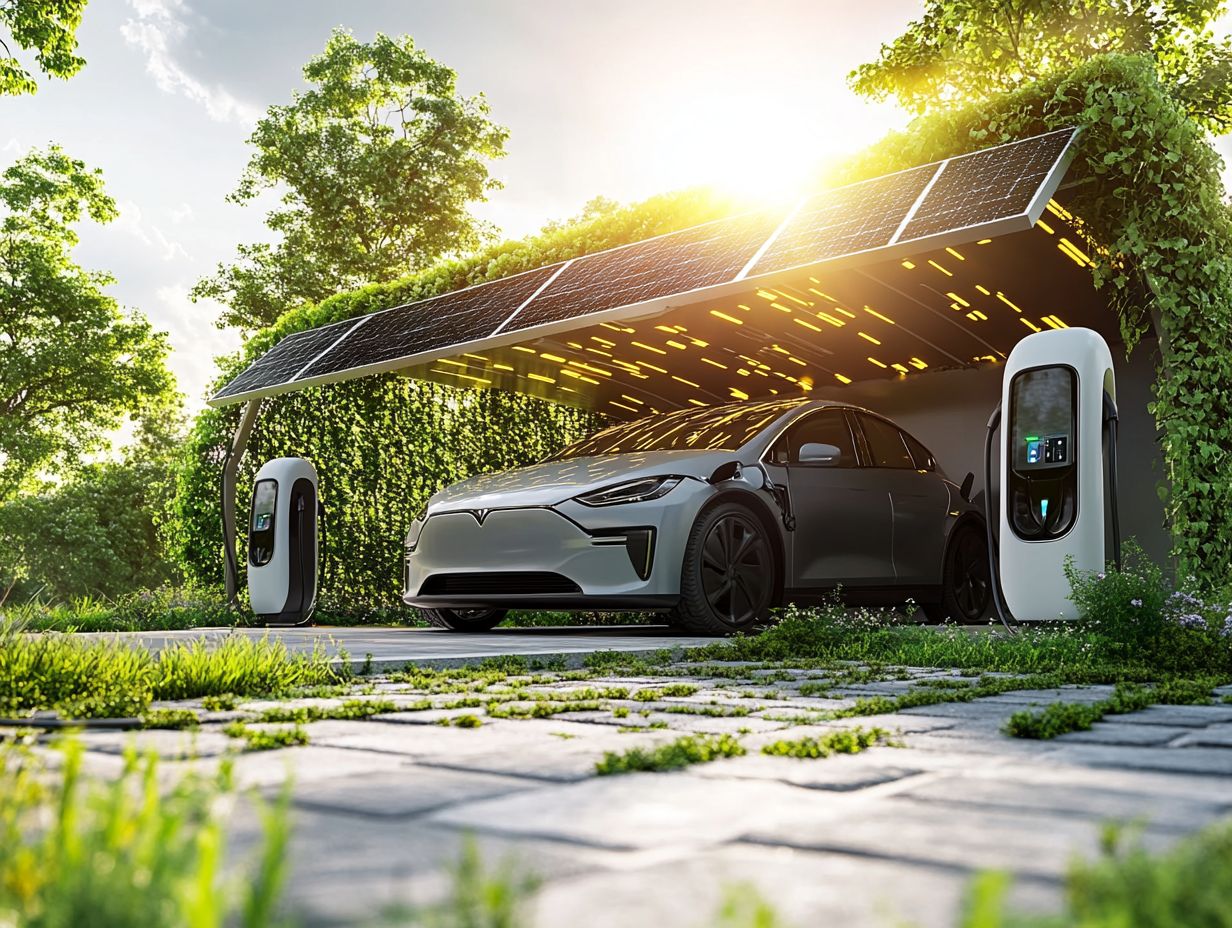
Renewable energy is essential for EV charging as it reduces dependency on fossil fuels and helps combat climate change. Solar, wind, and hydroelectric energy are commonly used for EV charging, providing a sustainable and clean power source. Using renewable energy for EV charging has numerous benefits, including reduced environmental impact and cost savings for consumers.
The Importance of Renewable Energy in EV Charging
The significance of renewable energy in electric vehicle (EV) charging is paramount; it directly addresses climate change and cuts greenhouse gas emissions while moving away from fossil fuels.
By harnessing renewable energy sources like solar and wind power, you can enhance energy efficiency, improve air quality, and contribute to a sustainable future for transportation.
Incorporating renewable energy into your charging infrastructure supports effective energy management and aligns with global emissions reduction targets. This sets the stage for cleaner, more efficient electric vehicles.
Why Renewable Energy is Essential for EVs
Renewable energy is crucial for electric vehicles (EVs) because it directly influences their carbon footprint and plays a significant role in reducing emissions.
When you harness solar, wind, and hydroelectric power for electricity generation, your dependence on fossil fuels decreases. This paves the way for greater energy independence, stabilizing energy prices and bolstering the security of your energy supply.
Embracing clean energy brings environmental benefits vital for the charging infrastructure of electric vehicles. By powering your EVs with renewable sources, you actively contribute to reducing greenhouse gas emissions and creating a healthier atmosphere.
This commitment builds a sustainable transportation system and supports global efforts to fight climate change.
Types of Renewable Energy Used in EV Charging
Explore the exciting types of renewable energy powering electric vehicle (EV) charging today, each presenting distinct advantages.
These sources play a vital role in creating a cleaner energy mix, supporting a more sustainable approach to transportation.
Solar Energy
Solar energy stands out as one of the most widely embraced forms of renewable energy, particularly in charging stations for electric vehicles, thanks to its ability to generate clean electricity efficiently.
This remarkable technology captures sunlight through photovoltaic cells, which are devices that convert sunlight into electricity. By integrating solar panels at your home, workplace, or even public charging stations, you can enjoy significantly reduced energy costs while championing sustainability.
When you charge electric vehicles with solar-generated power, you re not just saving money; you re also shrinking your carbon footprint, making a conscious choice for the environment.
Thoughtful solar panel installations enhance your energy efficiency by tapping into renewable sources and contribute to grid stability, allowing for an energy surplus during sun-drenched peak hours.
This powerful connection between solar energy and EV charging can lead us to a brighter, greener future let s seize this opportunity now!
Wind Energy
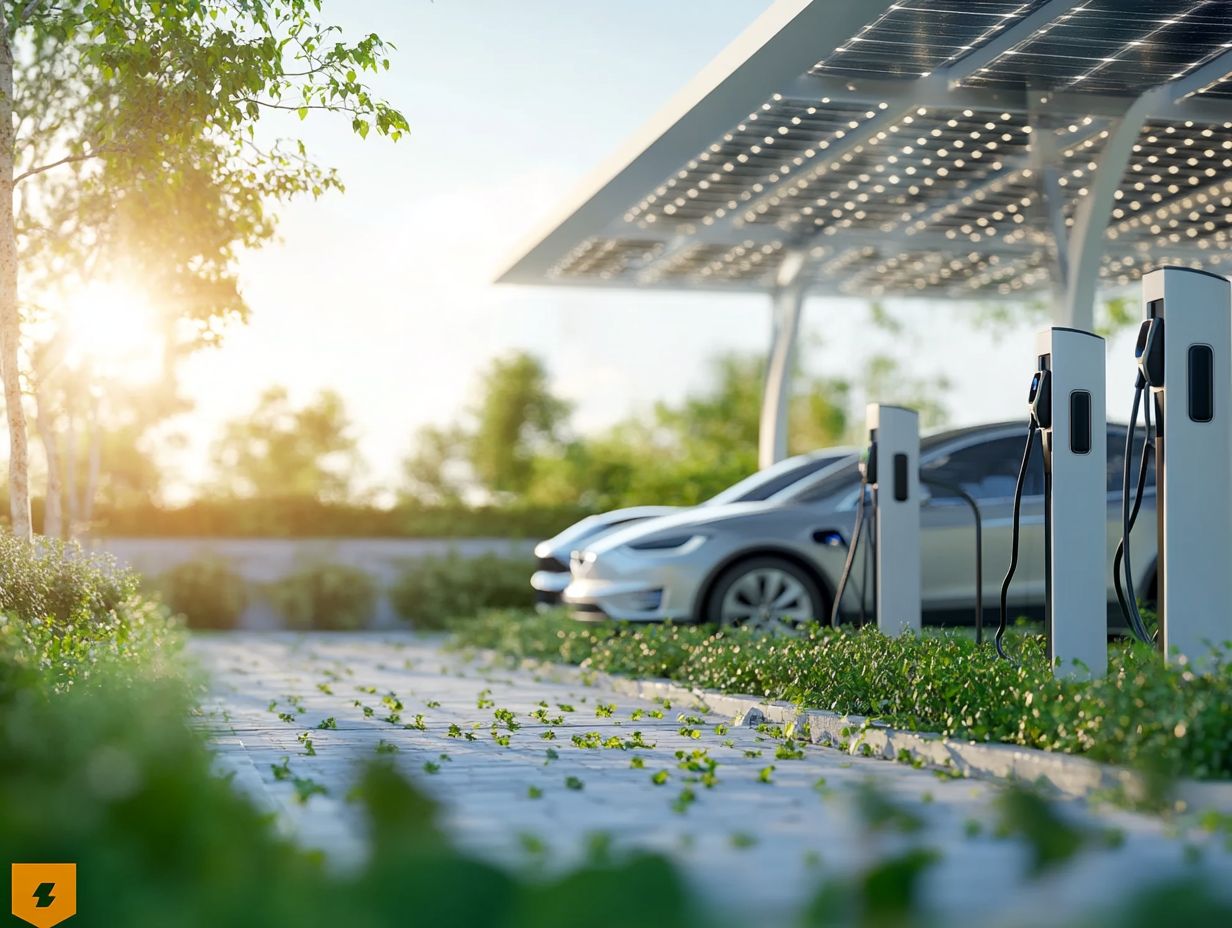
Wind energy stands as an important part of renewable energy, especially in powering the charging infrastructure for electric vehicles. By harnessing this sustainable power source, you can significantly lessen your dependence on fossil fuels.
Through the ingenious use of turbines, the kinetic energy (the energy of moving air) generated by the wind transforms into electricity. This provides the perfect solution for charging electric vehicle batteries.
The advantages of incorporating wind power into your energy management systems are impressive:
- Wind energy leads to lower operational costs.
- It results in reduced carbon emissions.
- Wind power bolsters energy security.
As the charging infrastructure continues to evolve, integrating wind energy becomes essential for facilitating a seamless transition to renewable sources. With its remarkable scalability, wind power is poised for widespread adoption. This effectively meets the growing demand for electric vehicles and paves the way for a more sustainable future.
Hydroelectric Energy
Hydroelectric energy is a crucial renewable resource that plays a significant role in supplying clean energy for electric vehicle charging. This is especially true in areas blessed with abundant water resources.
This energy generation method harnesses the mighty force of flowing or falling water to produce electricity. It often utilizes dams that manage water flow with precision.
With its remarkable capacity for energy storage, hydroelectric systems can swiftly respond to peak demands. This serves as a dependable ally to intermittent renewable sources like solar and wind.
By replacing fossil fuels, these systems dramatically reduce greenhouse gas emissions. They actively support global initiatives to combat climate change.
However, geographical factors such as suitable terrain and a consistent water supply can present challenges. Not every region possesses the ideal conditions for effective hydroelectric power generation.
Benefits of Using Renewable Energy for EV Charging
The benefits of utilizing renewable energy for electric vehicle (EV) charging are numerous and compelling. By embracing this approach, you can significantly reduce your environmental footprint.
Moreover, you can enjoy substantial cost savings and enhance energy consumption efficiency. This choice supports a cleaner and greener future while promoting the proliferation of cleaner vehicles on the road.
Environmental Impact
The environmental impact of using renewable energy for EV charging is truly remarkable. By harnessing these sustainable sources, you play a crucial role in reducing emissions and enhancing air quality.
Recent studies reveal that integrating renewable sources into the energy infrastructure can cut carbon emissions by up to 70% compared to traditional fossil fuels. For instance, a report from the National Renewable Energy Laboratory illustrates that transitioning to solar or wind power for EV charging could result in an annual reduction of 300 million tons of carbon dioxide by 2030.
Various government incentives, such as tax credits and grants, are paving the way for you to adopt these sustainable practices more easily. These initiatives allow both consumers and businesses to transition to greener energy solutions.
Policies like the federal investment tax credit further support the growth of renewable energy, helping to create a cleaner environment for future generations.
Cost Savings
Cost savings from renewable energy in EV charging offer a compelling incentive for both consumers and businesses. This shift allows for lower charging rates and improved energy efficiency, making it an attractive option.
These benefits not only boost profitability for operators but also contribute to a more sustainable energy grid. This aligns with global initiatives to combat climate change.
By integrating solar panels or wind turbines at charging stations, you can significantly cut down on energy bills. This transition to cleaner energy becomes even more enticing. As these savings accumulate over time, they enable reinvestment in infrastructure or lower costs for consumers truly a win-win scenario.
Moreover, government incentives can enhance these economic advantages. This fosters a broader adoption of renewable energy technologies and cleaner vehicles in the market.
Imagine saving money while saving the planet! Consider renewable energy solutions for your EV charging needs today.
Challenges and Solutions for Implementing Renewable Energy in EV Charging
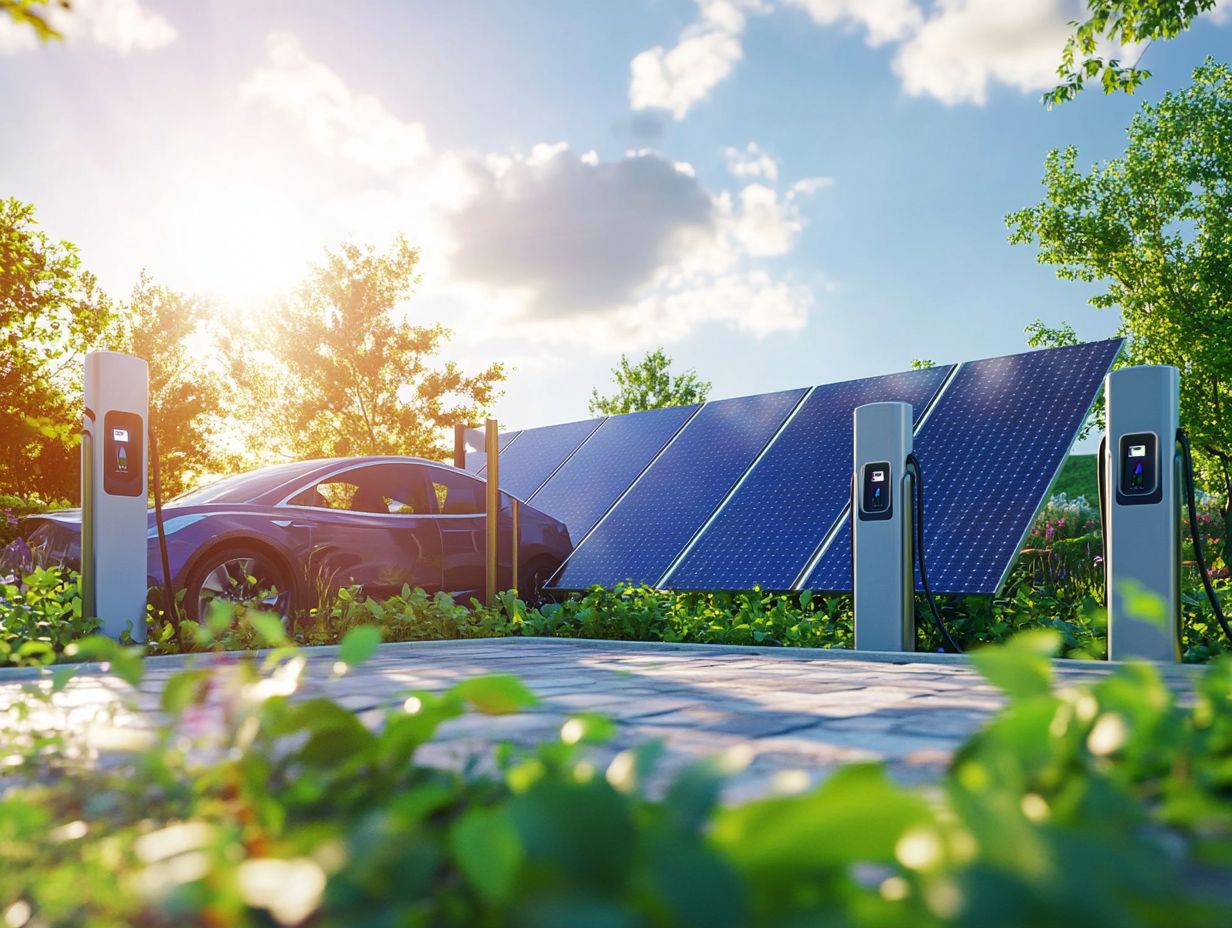
Implementing renewable energy in EV charging comes with challenges, especially regarding infrastructure development and grid integration.
However, innovative solutions are emerging to tackle these issues and pave the way for a more sustainable future.
Infrastructure and Grid Integration
Grid stability is crucial for integrating renewable energy into electric vehicle (EV) charging. A robust charging infrastructure supports this integration.
By utilizing smart grid technology an advanced electricity network that helps manage energy use efficiently you can significantly optimize energy management. This allows for real-time adjustments to accommodate unpredictable energy supplies from solar and wind sources.
These advancements create a more reliable and flexible charging environment for electric vehicles.
The rise of smart grids enhances EV adoption. Charging stations can adeptly manage varying energy demands, instilling confidence in users regarding the accessibility and reliability of charging options.
Storage Solutions
Energy storage solutions are crucial for charging electric vehicles (EVs) with renewable resources. They help navigate the ebb and flow of energy supply and demand.
Technologies like lithium-ion batteries, flow batteries, and promising new solid-state solutions are instrumental in this transition. They ensure charging stations have a stable power source, making your charging experience seamless.
By storing excess energy generated during peak production times like sunny afternoons or windy days these solutions can swiftly deliver power when demand spikes. This effectively bridges the gap between energy generation and consumption.
As energy storage technologies advance, with improvements in battery efficiency and faster charging times, you can anticipate a significant increase in integrating renewable sources. This development will make electric mobility more accessible and efficient, enhancing your experience and laying the groundwork for a greener future.
Future Outlook for Renewable Energy in EV Charging
The future outlook for renewable energy in electric vehicle (EV) charging is exceptionally promising.
You can expect significant growth driven by technological advancements and a heightened focus on sustainable energy solutions. This convergence enhances the efficiency of EV charging and aligns with a broader commitment to environmental stewardship.
Potential Growth and Advancements
The potential for renewable energy in EV charging is incredibly exciting, especially as technology continues to enhance the efficiency and integration of these clean energy sources.
Innovations in solar panel efficiency and advanced storage solutions are setting the stage for sustainable charging stations that effectively harness clean energy. The emergence of intelligent grid systems helps you manage electricity supply more effectively, making it easier to incorporate solar and wind energy into your charging infrastructure.
As electric vehicle adoption increases predicted to surge as consumers prioritize sustainability the relationship between renewable energy and EV charging is evolving into something vibrant and dynamic. This connection fosters a greener transportation ecosystem, benefiting both the environment and the advancements in technology that matter to you.
Frequently Asked Questions
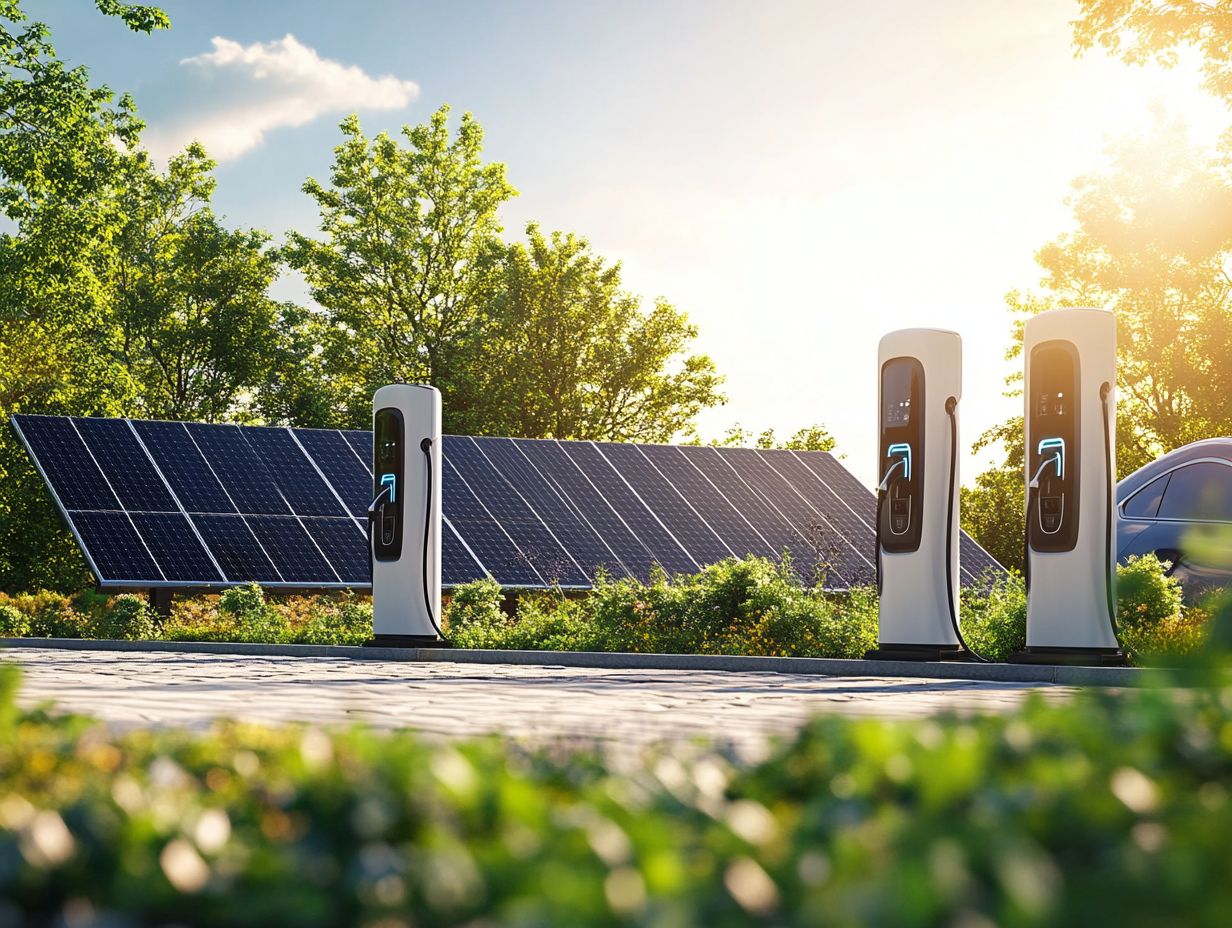
What is the role of renewable energy in EV charging?
The role of renewable energy in EV charging is to provide a sustainable power source for charging electric vehicles, such as solar energy in EV charging solutions. This helps reduce reliance on non-renewable sources and promotes environmental conservation.
How does renewable energy impact EV charging infrastructure?
Renewable energy positively impacts EV charging infrastructure by making it more sustainable and cost-effective. It also helps diversify the energy sources used to power electric vehicles.
Can renewable energy be used for fast-charging EVs?
Yes, renewable energy can power fast-charging EVs. The local availability of these energy sources and existing charging infrastructure can impact speed and efficiency.
What are the benefits of using renewable energy for EV charging?
Using renewable energy lowers carbon emissions and operating costs. It also boosts energy security.
This shift supports the renewable energy industry and paves the way for a sustainable future!
Are there any challenges associated with using renewable energy for EV charging?
One challenge is the inconsistent availability of renewable energy, which can affect charging reliability. There may also be initial costs related to setting up renewable energy infrastructure for charging.
How can I ensure that my EV is charged using renewable energy?
Install renewable energy sources, like solar panels, at home or work. Many public charging stations offer the option to choose renewable energy for your EV.




